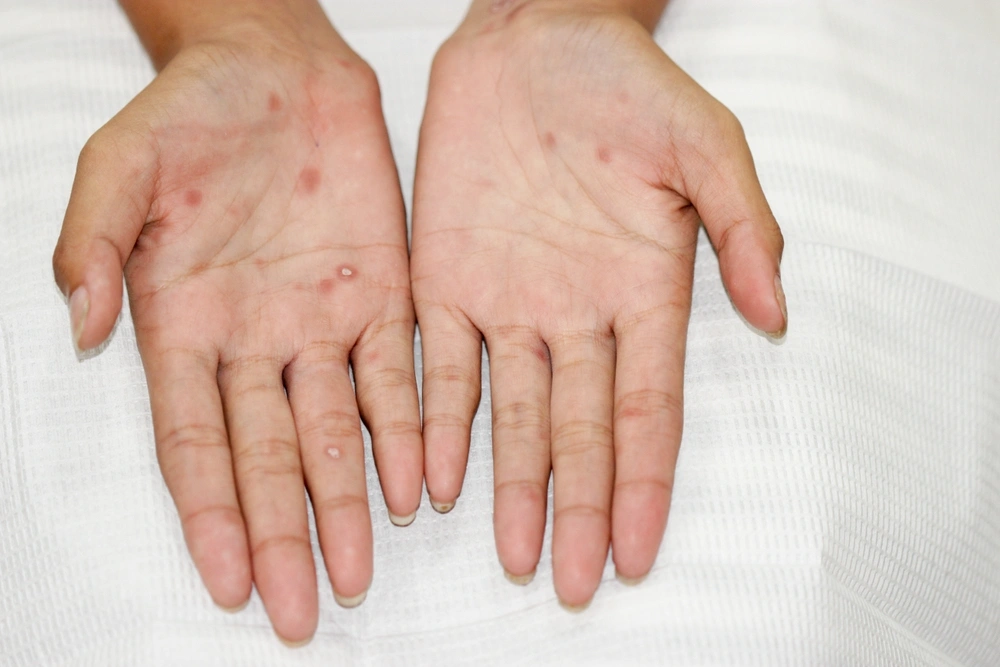Imagine carrying a disease and not even knowing it—this is possible with syphilis.
Here’s what happens if you have syphilis without experiencing any signs or symptoms.
Is it possible to have syphilis without any signs or symptoms?
Syphilis without signs, often referred to as latent syphilis, is a stage of the syphilis infection where you may not show any visible symptoms.
This condition can follow the initial stages of syphilis, which may present with sores or rashes, but once it transitions into the latent phase, these overt signs disappear. Despite the absence of symptoms, the infection remains in your body and can be detected through blood tests.
This silent phase can last for years, and without treatment, it has the potential to progress to tertiary syphilis, which can lead to severe health complications that affect your other organs, including:
- Heart
- Brain
- Nervous system
How can syphilis be asymptomatic?
Syphilis can be asymptomatic due to its ability to present symptoms that are either too mild to notice or mimic those of other illnesses.
In its primary stage, syphilis might cause a chancre, which is a single and painless sore that can easily be overlooked.
As the infection progresses to the secondary stage, it may cause symptoms like rash or flu-like symptoms, which can be mistaken for common illnesses.
This ability of syphilis to “hide” by presenting non-specific or absent symptoms contributes to its asymptomatic nature, which makes regular screening and early diagnosis essential for effective treatment and prevention of transmission.
Why is early diagnosis of syphilis crucial?
If you get diagnosed with syphilis early, your healthcare provider can help you with timely treatment. This prevents the disease from advancing to more harmful stages.
With this, you can:
- Stop the progression of the disease
- Reduce the risk of severe health complications
- Decrease the likelihood of unknowingly transmitting the infection to others
How is syphilis diagnosed if you don’t show symptoms?
Even if you’re asymptomatic, your healthcare provider can diagnose syphilis through blood tests that detect antibodies produced in response to the syphilis bacteria. Additionally, physical examinations may uncover latent signs of the disease that you may not notice.
How do you treat syphilis?
The most effective treatment for syphilis is Penicillin G, administered via injection. This antibiotic treatment is the gold standard for targeting the syphilis bacteria and helping to eradicate the infection from your body.
If you’re allergic to penicillin, your healthcare provider can prescribe alternative antibiotics that are still effective for treatment.
Following the initial treatment, you need to do follow-up blood tests to monitor the treatment’s effectiveness and prevent potential relapse or the progression of the disease to more harmful stages.
How does untreated asymptomatic syphilis impact long-term health?
Untreated asymptomatic syphilis significantly increases the risk of developing tertiary syphilis, a stage that can cause severe damage to the heart, brain, and other organs.
This advanced stage of the disease can lead to life-threatening complications, such as:
- Neurological disorders
- Cardiovascular issues
- Stroke
- Aortic aneurysm
What preventive measures can reduce the risk of syphilis?
Here are what you can do to prevent the risk of syphilis:
- Regular STD screening. If you have a new partner or multiple sexual partners, or if you’re part of high-risk groups, this can help with early detection.
- Practice safe sex. Using condoms consistently during sexual activities can decrease the risk of transmission.
- Prompt treatment and notification of all sexual partners. If you receive a diagnosis, undergo prompt treatment and notify all your sexual partners to prevent the spread and reinfection of the disease.
Frequently asked questions
Can syphilis be present without any visible symptoms?
Yes, syphilis can exist in your body without showing any outward signs. This stage, often referred to as latent syphilis, may not manifest any noticeable symptoms for years.
How is syphilis detected if there are no signs?
Syphilis is detected through blood tests. These tests search for antibodies produced by the body in response to the infection. With that, they can provide a diagnosis even without symptoms.
Is syphilis contagious when symptoms are not present?
Syphilis remains contagious even when symptoms are not visible, particularly in the early and latent stages. Transmission can occur through close physical contact, including sexual contact.
What are the risks of untreated syphilis without signs?
Untreated syphilis can progress to serious health issues, including damage to the heart, brain, and other organs. This can occur even without initial signs, which is why early detection and treatment are important.
Can pregnant women transmit syphilis to their babies if they show no signs of the disease?
Pregnant women can transmit syphilis to their unborn children, a condition known as congenital syphilis, even if the mother exhibits no symptoms. This can lead to severe outcomes for the baby.
Key takeaway
Syphilis can be deceptive. As latent syphilis can exist silently in your body without showing any visible symptoms, it’s your responsibility to make regular screenings part of your healthcare routine.
Effective treatment is crucial to prevent the progression to more severe stages of the disease, which can cause significant long-term health complications. By adhering to preventive measures such as regular STD screenings and practicing safe sex, you can minimize the risks associated with syphilis.




















































